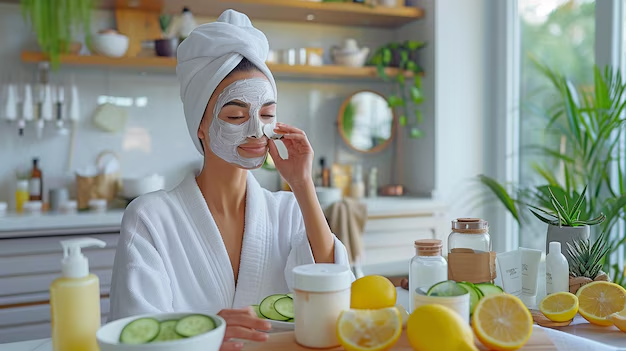What Are The Best Vitamins For Skin Care?

Your skin is like a shield, keeping your body safe. It needs the right mix of nutrients. Eating the right foods makes your skin healthy and glowing. Lack of healthy fats can make your skin look old. Vitamins and minerals do a lot for your skin. They act as shields from the sun, help heal wounds, and keep your skin moist. The top vitamins and minerals for great skin include vitamins D, C, E, B3, A, and zinc.
Key Takeaways
- Vitamins and minerals are key to healthy, radiant skin.
- Important vitamins for skin are D, C, E, B3, A, and zinc.
- These help as antioxidants, shield from UV, and keep skin strong and moist.
- Adding vitamin-rich foods and supplements can improve your skin.
- See a doctor before taking extra vitamins for your skin.
The Importance of Vitamins for Skin Health
What we eat affects our skin a lot. A diet rich in nutrients can help our skin look and function better. Vitamins are key in keeping our skin healthy and young.
Antioxidant and Anti-Inflammatory Benefits
Vitamins like C and E work as antioxidants, fighting off skin damage. This means they can help reduce signs of aging, soothe inflammation, and protect skin from the sun. They help maintain a youthful look and keep skin healthy.
Also Read : What Foods Provide Good Nutrition For Skin?
Skin Barrier Function and Hydration
Vitamin A and the B-complex group are vital for our skin’s protective barrier and keeping it hydrated. A strong skin barrier prevents water loss and wards off environmental harm. This keeps our skin glowing and healthy.
Also Read : Which Fruits And Vegetables Are Best For Glowing Skin?
Getting a mix of vitamins from food or supplements can vastly improve skin health. Knowing what each vitamin does can guide us to choose the best for our skin.
Also Read : What Mistakes Should I Avoid In A Basic Skincare Routine?
“Vitamins are essential for the proper functioning and appearance of our skin. A nutrient-packed diet makes a big difference in skin health and looks.”
Vitamin D: The Sunshine Vitamin
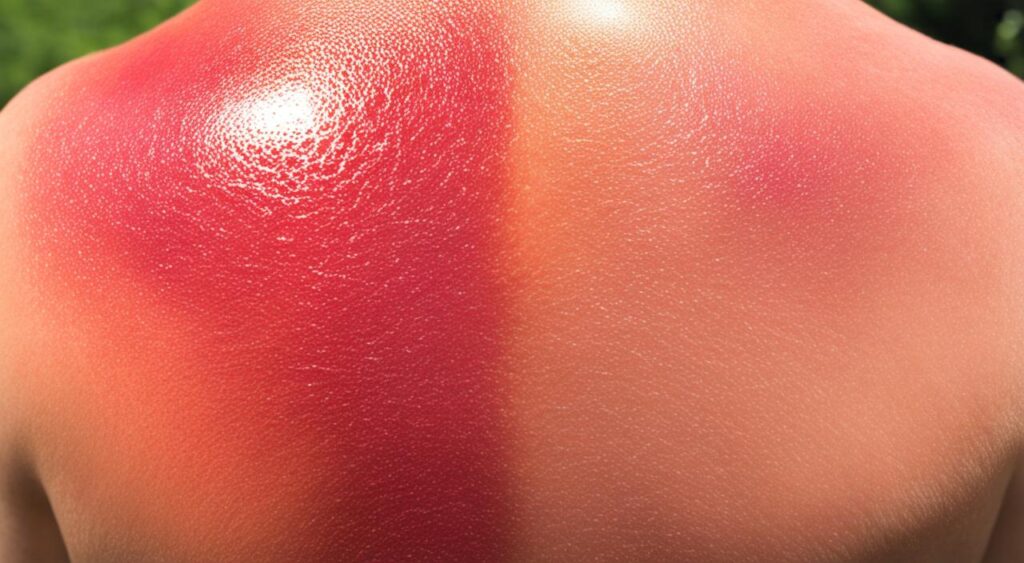
Vitamin D is not just good for strong bones. It also helps prevent skin cancer. Studies show that people with enough vitamin D have a lower risk of melanoma. This is the most dangerous skin cancer. On the other hand, low vitamin D levels increase the risk of melanoma.
Also Read : What Are The Steps In A Skin Care Routine At Night?
A study looked at older women with non-melanoma skin cancer history. Those who took a vitamin D and calcium supplement had a lower melanoma risk. This shows how vital vitamin D might be in preventing skin cancer.
Also Read : What Is A Simple Skin Care Routine For Beginners?
Vitamin D and Skin Cancer Risk
Our skin makes vitamin D from sunlight. But too much sun can harm us. That includes an increased risk of skin cancer. So, it’s best to get your vitamin D from food or supplements.
“Ensuring adequate vitamin D levels may be an important factor in reducing the risk of melanoma and improving outcomes for those diagnosed with the disease.”
Keeping your vitamin D levels up is crucial for fighting skin cancer. Eating foods high in vitamin D or taking supplements can help. This simple step can improve your skin’s health.
More research is needed on vitamin D and skin health. But, early findings are promising. They suggest vitamin D can help keep our skin safe. By managing your vitamin D and sun exposure, you can help your skin stay healthy. This may lower your skin cancer risk too.
Vitamin C: The Powerful Antioxidant

Vitamin C is super important for keeping our skin healthy. It works as a strong antioxidant. This means it protects our skin from the sun’s harmful UV rays. Vitamin C does this by keeping the skin barrier strong. This barrier helps stop water and nutrients from leaving our skin.
Vitamin C also helps make collagen. Collagen is like the support system for our skin, making it elastic and firm. This makes our skin look and feel young and healthy. Vitamin C can even out sun-induced dark spots when we use it in serums.
But, here’s the tricky part. Vitamin C can break down easily from heat and light. So, it’s smart to pick skin care products with vitamin C that stays strong. This way, you get the most benefits for your skin.
You can find vitamin C in many fruits and vegetables. Think oranges, lemons, bell peppers, broccoli, and strawberries. Eating these foods every day can really boost your skin’s health.
| Vitamin C-Rich Food Sources | Vitamin C Content (per serving) |
|---|---|
| Orange (1 medium) | 70 mg |
| Red bell pepper (½ cup, chopped) | 95 mg |
| Broccoli (1 cup, cooked) | 81 mg |
| Strawberries (1 cup, halves) | 89 mg |
“Vitamin C is a powerful antioxidant that helps protect the skin from environmental stressors and supports the skin’s natural barrier function.”
Vitamin E: Protecting Against UV Damage
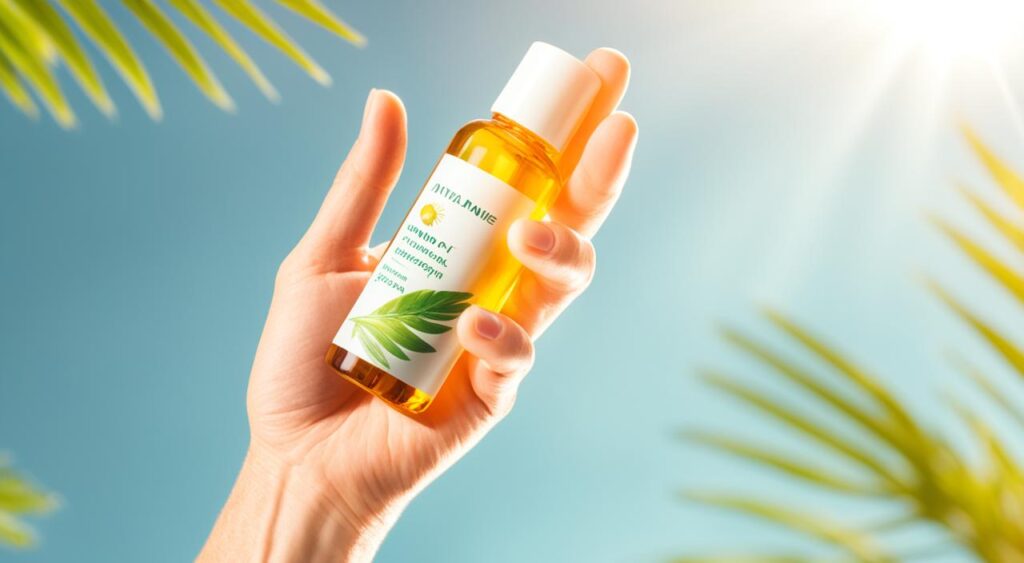
Vitamin E is a mighty antioxidant. It guards our skin from UV damage, pollution, and smoke. It’s needed for the body to make collagen and elastin, keeping our skin young and stretchy.
When our skin meets UV light, free radicals form. These can harm skin cells and speed up aging. Vitamin E steps in to fight these free radicals off. It helps prevent redness and swelling from too much sun.
Vitamin E for Skin Elasticity
Vitamin E does more than fight off damaging free radicals. It also helps keep our skin bouncy and strong. It does this by making sure our skin makes enough collagen and elastin, which we need for a youthful look.
Vitamin E belongs to a group of fat-soluble antioxidants. You can find it in nuts, seeds, and vegetable oils. Eating plenty of leafy greens and fortified cereals also helps keep your skin healthy.
“Vitamin E is a potent antioxidant that plays a crucial role in maintaining the skin’s barrier function and protecting it from environmental stressors like UV radiation.”
| Nutrient | Primary Functions | Good Sources |
|---|---|---|
| Vitamin E |
|
|
Vitamins For Skin Care: The Key Players
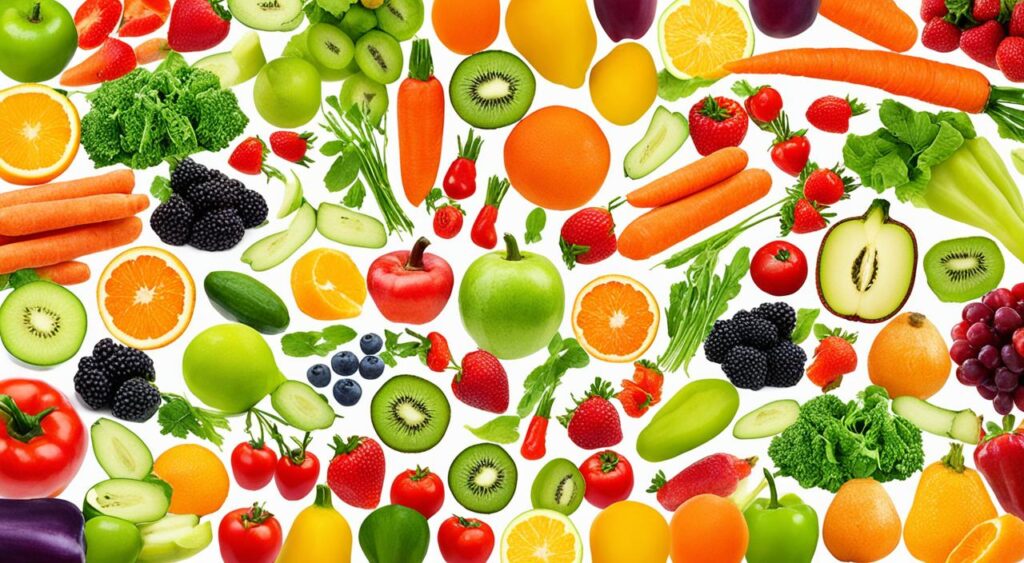
When we talk about keeping a glowing face, vitamins and minerals are key. They help protect our skin from bad elements, keep our skin strong, make collagen, lower swelling, and fight aging signs.
The important skin-loving vitamins and minerals are D, C, E, B3, and A, plus zinc. All these boost skin health in unique ways, keeping our skin fresh and pretty.
Vitamin D, the “sunshine vitamin”, is a must for skin. It helps the skin fight diseases and lowers skin cancer risk. Vitamin C, an amazing antioxidant, protects the skin from harm and makes collagen. This keeps the skin elastic and tight.
Vitamin E, also a strong antioxidant, guards the skin against sun damage. Meanwhile, vitamin B3 (niacinamide) repairs the skin, helping it heal and grow anew. Vitamin A, as retinoids, is great at lessening wrinkles, fine lines, and age spots.
Then, there’s zinc. It’s great for the skin, fighting swelling and helping with the skin’s defense.
With enough of these vitamins and minerals, in a healthy diet or supplements, your skin can stay young and well, even against the dangers of time and the environment.
“Eating right, getting the vitamins and minerals you need, is key to a lovely, healthy skin.”
Vitamin B3: Barrier Repair and Skin Regeneration
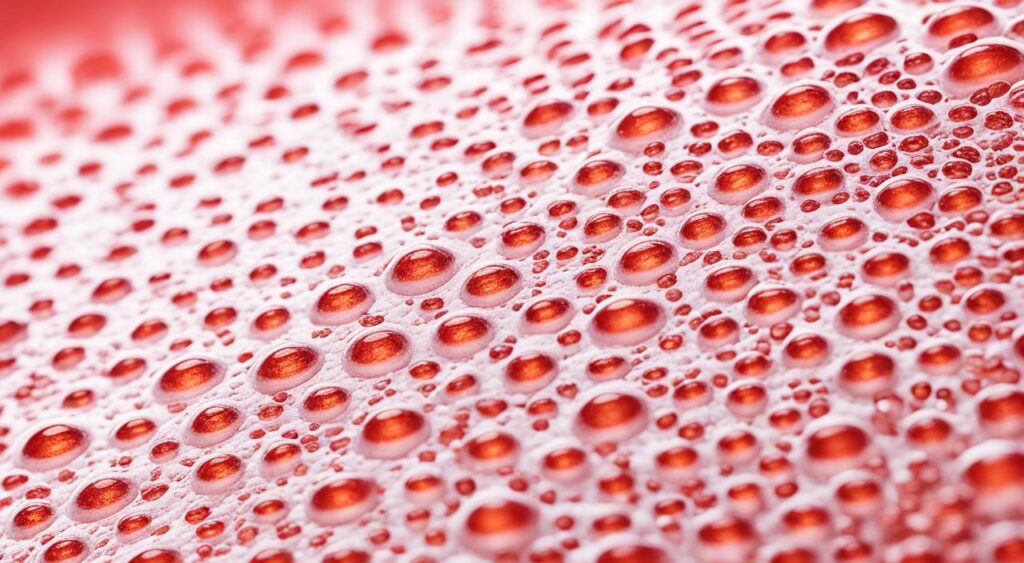
Nicotinamide, known as niacinamide or vitamin B3, is a key ingredient in skin care. It has many benefits, like boosting the skin’s barrier, reducing inflammation, and helping with DNA repair.
vitamin B3 helps the skin a lot by making ceramides, which keep the skin moist and safe. This helps stop moisture loss and protect the skin from bad things in the air.>
Besides making the skin stronger, vitamin B3 also fights skin problems as an antioxidant. It calms down skin that’s irritated, red, or has acne. This is great news for people with sensitive or acne-prone skin.
Nicotinamide for DNA Repair
vitamin B3 also looks like it might lower the chance of getting skin cancer. Studies show it helps fix skin after it’s been damaged by the sun’s UV rays. This is due to its benefits in DNA repair.
Luckily, vitamin B3 is in lots of foods, like meat, fish, nuts, and grains. So, it’s easy to get into your daily meals for better skin health.
“Nicotinamide is a form of vitamin B3 that plays a crucial role in maintaining the health and integrity of the skin’s protective barrier.”
| Benefits of Vitamin B3 for Skin | Mechanisms of Action |
|---|---|
| Improved skin barrier function | Increases ceramide production |
| Reduced skin inflammation | Antioxidant properties |
| Enhanced DNA repair | Replenishes molecules needed for skin repair |
Vitamin A: The Multi-Tasking Vitamin
Vitamin A is like the superhero of skin health. It does a lot for our skin, keeping it healthy in many ways. It helps our skin renew itself, fight sun damage, and make our skin feel and look better.
Retinoids and Their Skin Benefits
Retinoids come from vitamin A. You can find them in many skincare products because they’re amazing for making skin look great. Known as retinol, retinoic acid, and retinaldehyde, these compounds are great at renewing skin cells, making more collagen, and fading lines and wrinkles.
They speed up how fast our skin cells renew, making our face brighter and smoother. This means they help get rid of the old, bad skin cells quickly. Then, our skin is left looking fresh and glowing.
These retinoids also protect the collagen in our skin. Collagen is what keeps our skin looking young and full. By keeping collagen in good shape, they slow down skin aging, like fine lines and wrinkles.
Plus, they’re really good at fighting acne. They control oil and reduce redness in the skin. So, they don’t just keep your skin looking youthful; they also help with acne and other skin issues.
Vitamin A and its derivatives are great for skin in many ways. They work well both inside the body and outside, on the skin. So, if you want healthy skin, vitamin A and its forms are key.
The top food sources of vitamin A are liver, fish, eggs, dairy, and orange and yellow veggies. Think carrots, sweet potatoes, and bell peppers. Eating these foods helps your skin, especially if you also use vitamin A in your skincare routine.
Zinc: The Anti-Inflammatory Mineral
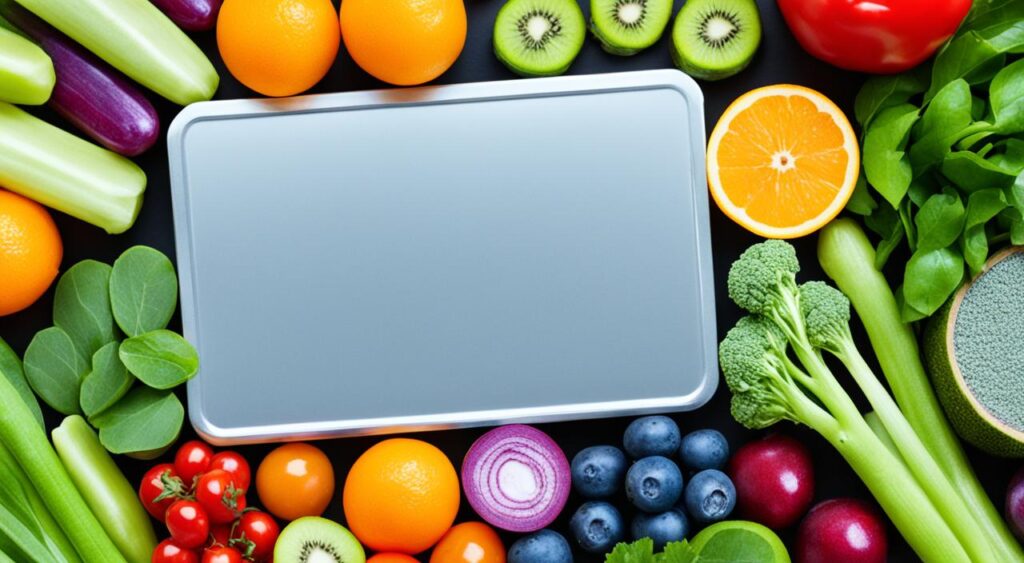
Zinc is a key mineral for healthy skin. It aids in fighting inflammation and helps with many skin issues.
Zinc is great for calming red rashes, like rosacea, acne, eczema, and dermatitis. It cuts down on swelling, which eases redness, itch, and soreness.
Aside from battling inflammation, zinc shields the skin from the sun. For example, in mineral sunscreens, zinc oxide blocks UV rays. This protects against skin damage from the sun, which can speed up aging and raise the cancer risk.
Notably, zinc aids in keeping the skin’s outer layer strong and well-moisturized. This stops water loss and maintains a healthy look and feel.
“Zinc is a true multitasker when it comes to skin health. It’s an essential mineral that can address a variety of skin concerns, from inflammation to sun protection.”
Zinc works wonders for the skin, whether you eat it or put it on. Its positive effects make it a must-have for good skin care.
Food Sources of Skin-Friendly Vitamins
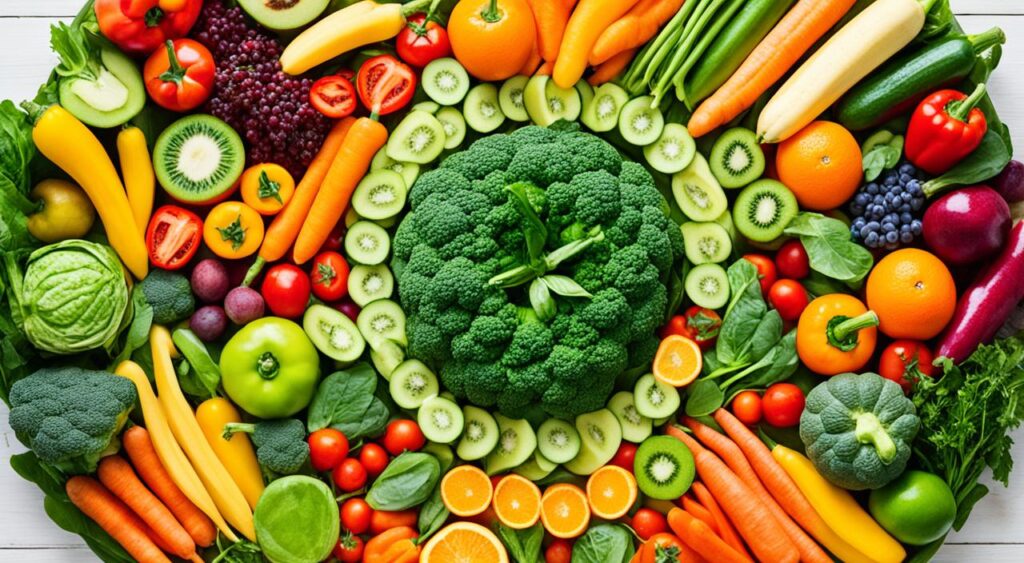
Foods you eat are key to keeping your skin healthy and glowing. Many vitamins and minerals from food help your skin. Discover the top options from both plants and animals to improve your skin.
Plant-Based vs. Animal-Based Sources
Adding fruits and veggies to your meals gets you skin-loving vitamins and antioxidants. These foods from plants give your skin what it needs. They are full of vitamins A, C, and E, and omega-3s. Think of foods like kale, spinach, and collards for vitamins and omega-3s.
Yet, meats and fish also offer needed nutrients for our skin. Fatty fish, including salmon and sardines, are great. They’re rich in protein, omega-3s, and selenium, key for skin. Don’t forget eggs, which contain vitamins A and E, selenium, and zinc.
Both plant and animal foods help keep our skin healthy. A balanced diet that includes many different sources is best for your skin.
| Nutrient-Dense Plant-Based Sources | Nutrient-Dense Animal-Based Sources |
|---|---|
|
|
Eating a mix of plant and animal foods keeps your skin looking its best.
Also Read: How To Use Oranges For Natural Skincare: Benefits & DIY Recipes
Conclusion
To keep your skin healthy and glowing, it’s crucial to get the right amount of key vitamins and minerals. Important ones for skin health are vitamins D, C, E, B3, A, and zinc. They help the skin fight off harm from the environment, keep its barrier strong, boost collagen, and lower swelling. They also can help slow down how fast your skin ages.
The ideal way is to eat a balanced diet full of various fruits, veggies, good fats, and proteins. This ensures you get enough of these important vitamins and minerals for your skin, whether from food or supplements. Doing so will make your skin stay healthy and glowing.
Focusing on getting the right skin-friendly vitamins and minerals helps your skin look and feel better. By adding these crucial nutrients to your daily eating plan, you protect your skin from within. This is a straightforward method to keep your skin looking youthful and vibrant.
FAQs
Q: What are the best vitamins for improving skin health?
A: The best vitamins for improving skin health are usually vitamin C, vitamin E, vitamin A, and vitamin D. These vitamins help in promoting skin hydration, improving skin tone, and maintaining overall skin health.
Q: How can supplements help in maintaining healthy skin?
A: Supplements containing essential vitamins and minerals can help in promoting healthy skin by providing the necessary nutrients that may be lacking in your diet. These supplements can improve skin hydration, protect the skin from damage, and support overall skin health.
Q: What is the role of topical vitamins in skincare?
A: Topical vitamins, such as topical vitamin C and vitamin E, can be beneficial for the skin when applied directly. They can help in reducing the appearance of common skin conditions, promoting glowing skin, and protecting the skin from environmental damage.
Q: Which vitamins are best for maintaining healthy hair and nails?
A: B vitamins, especially biotin, are essential for maintaining healthy hair and nails. Other vitamins like vitamin A, vitamin C, and vitamin E also play a role in promoting hair and nail health.
Q: How do vitamins and supplements impact skin health?
A: Vitamins and supplements play a crucial role in impacting skin health by providing essential nutrients that support skin hydration, skin elasticity, and overall skin appearance. They can also help in protecting the skin from free radicals and certain skin conditions.
Q: What are the benefits of using topical vitamin C for the skin?
A: Topical vitamin C is known for its antioxidant properties that help in brightening the skin, reducing the appearance of fine lines and wrinkles, and protecting the skin from sun damage. It can also aid in improving skin tone and texture.
Q: How can the best vitamins and supplements help in improving skin tone?
A: The best vitamins and supplements for skin health can help in improving skin tone by promoting collagen production, reducing hyperpigmentation, and enhancing skin radiance. Vitamin A, vitamin C, and vitamin E are commonly recommended for achieving an even skin tone.



